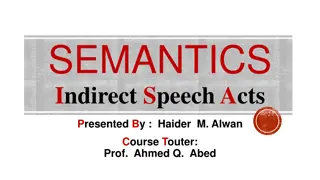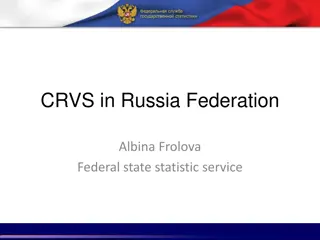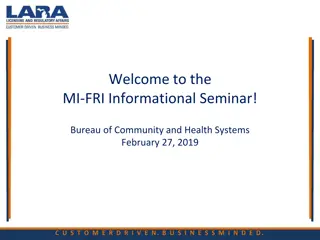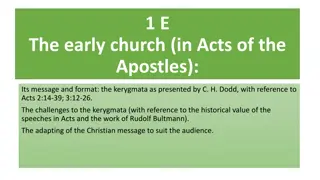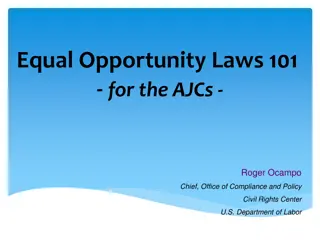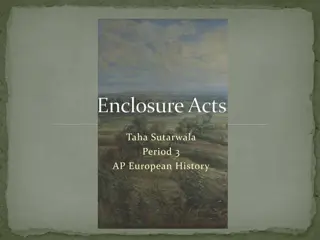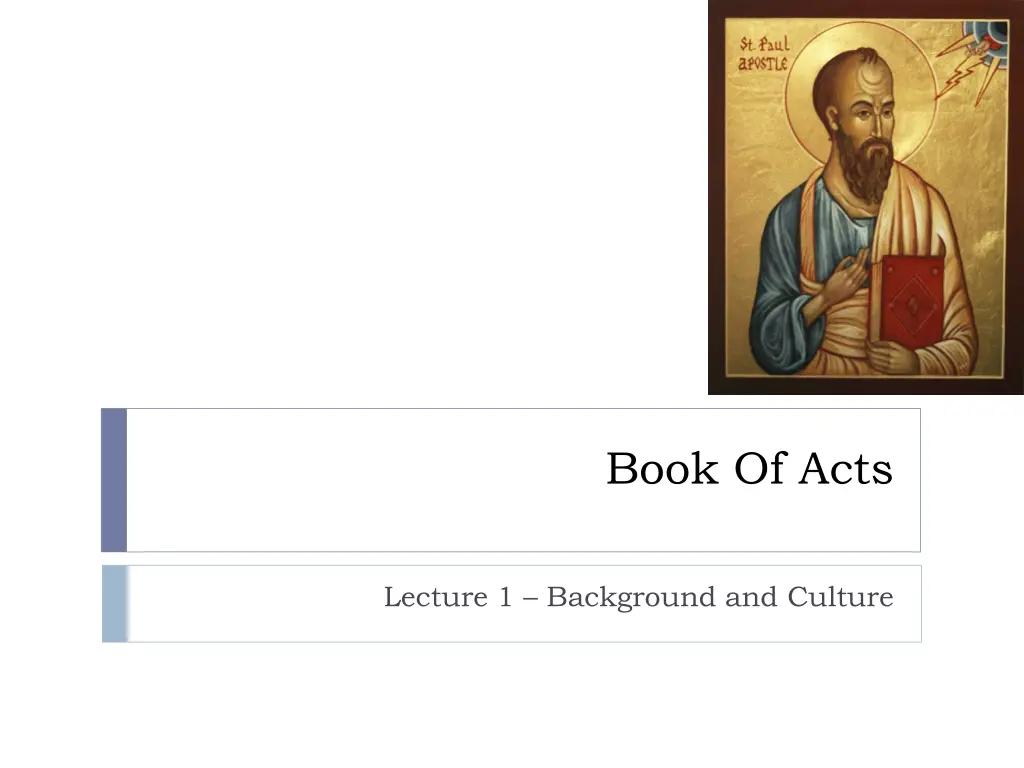
Background and Culture of the Book of Acts, Author Luke, and Writing Dates
Explore the historical context, authorship by Luke the Physician, and dates of writing of the Book of Acts. Delve into the cultural background, including insights into Theophilus, the timeline of events in Acts, and key milestones in the early Christian Church.
Download Presentation

Please find below an Image/Link to download the presentation.
The content on the website is provided AS IS for your information and personal use only. It may not be sold, licensed, or shared on other websites without obtaining consent from the author. If you encounter any issues during the download, it is possible that the publisher has removed the file from their server.
You are allowed to download the files provided on this website for personal or commercial use, subject to the condition that they are used lawfully. All files are the property of their respective owners.
The content on the website is provided AS IS for your information and personal use only. It may not be sold, licensed, or shared on other websites without obtaining consent from the author.
E N D
Presentation Transcript
Book Of Acts Lecture 1 Background and Culture
Author - Luke The author is Luke the Physician, a companion of Paul and probably a Gentile Well educated, familiar with formal titles, courts and procedures. Luke first writes the gospel of Luke, then Acts Luke-Acts were possibly part of Paul s legal defense in Rome, have very polished Greek, are Pro-Roman (centurions, governors always portrayed in a good light) Theophilus means Lover of Theos (God) possibly a real person or a general term of respectful address. Luke seems to be the instructor of Theophilus.
Date of Writing Before Paul s execution in A.D. 65 After Paul s first visit to Rome so between A.D 60-62 Definitely before the destruction of the Temple in 70 A.D. Both Jewish and Gentile Christians are very much part of the scene in Acts Acts has always been accepted as part of the New Testament canon (list of books) and is in the earliest lists such as the Muratorian Canon (170 A.D.) and fragments of Acts from as early as 110 A.D have been found.
Acts Timeline 1 A.D. 30 Jesus is crucified under Pontius Pilate. Resurrection appearances, Pentecost, initial growth of the church in and around Jerusalem. A.D. 31 33 The events of Acts 3 7 transpire with mounting concern on the part of Jews and especially the Jewish authorities in Jerusalem. The rising tension results in vigilante action taken against Stephen, and then an authorized effort under Saul to disrupt and even destroy this new messianic sect, involving persecution and even the death of some Christians (cf.Acts 8:1 3 to Gal. 1:13). The persecution led various Christians such as Philip to go elsewhere, such as Samaria, and bear witness (Acts 8:4 40). THE FIRST EIGHT CHAPTERS OF ACTS COVER ONLY THE PERIOD FROM ABOUT 30 TO 33. A.D. 33 or 34 Saul is converted on the road to Damascus during his period of persecuting the church (Acts 9; Galatians 1). A.D. 34 37 or 38 Saul is in Damascus and Arabia; he returns to Jerusalem for the first time as a Christian in 37.
Acts Timeline 2 A.D. 37 46 Saul sent off to Tarsus and home region. In the meantime, Peter has a notable ministry up and down the Mediterranean coast between Lydda, Joppa, and Caesarea, involving at least one notable Gentile and his family. This, in turn, leads to a report to the Jerusalem church (Acts 11). The precise timing is unknown. A.D. 43 James (brother of John) is killed, and Peter is imprisoned. A.D. 44 Agabus s prophecy in Antioch; Herod Agrippa dies. A.D. 46 48 famine in Judea. A.D. 48 Second visit by Paul to Jerusalem (with Barnabas, cf. Galatians 2) for famine relief to Jerusalem (Acts 11:29 30). A.D. 49 Claudius expels Jews from Rome; Priscilla and Aquila go to Corinth; Jerusalem council (Acts 15).
Acts Timeline 3 A.D. 50 52 Paul s second missionary journey (Acts 15:36 18:23). A.D. 51 or 52 The Gallio incident in Corinth (Acts 18). A.D. 53 57 Paul s third missionary journey (Acts 18:23 21:26). A.D. 57 59 Paul in custody under Felix, and then briefly under Festus. A.D. 59 60 Paul goes to Rome (for a fuller discussion of the Pauline material for the period from 48 to 50, see below). A.D. 60 62 Paul under house arrest in Rome.
Theological + Historical + Legal Paul wrote Luke-Acts to: Accurately put things in order (historical) To instruct and disciple Theophilus (theological) To defend the faith to the Roman world (legal) 1. 2. 3. Acts is also written by the Holy Spirit for the instruction of all believers at all times in how God works a) in His Church and b) through anointed leaders (apostles)
Apostles From Greek apostelo ones sent out on a mission, a messenger from a high authority, an ambassador, in Latin became missio as in emissary, missionary and diplomatic mission Paul calls himself an ambassador for Christ An apostle is someone sent out by Christ, to represent Christ and His Kingdom. It is the highest of the five church offices: Apostle, prophet, evangelist, pastor, and teacher (Ephesians 4:11)
6 Kinds of Apostles Jesus The Apostle and High Priest of Our Confession (Hebrews 3:1) sent directly from God as His ambassador to the whole world. The Twelve Apostles founders of the Faith, need to have been with Jesus from His baptism to His resurrection and ascension (no more of these today) The Thirty Mighty Men founders of the early Church in various areas, some wrote the Bible Paul, Silas, Barnabas, John-Mark. No one alive today can add to the Scriptures. God s Generals follow the founders of the Church and found the Kingdom in new areas and new eras: Timothy, Priscilla and Aquila, Apollos or Hudson Taylor or William Carey, perhaps only a couple of dozen alive at any one time. Apostolic Visionaries have authority and vision over a city or a sector e.g. the minor apostles mentioned in Romans 16, perhaps a few thousand of these today. False Apostles 2 Corinthians 11, false teachers, e.g. Joseph Smith of the Mormons.
Holding the Center The Pillars James the Brother of Jesus strict Jew, never leaves Jerusalem, Hebraic Peter: originally a strict kosher Jew, but eventually eats with Gentiles, travels extensively ministers only to Jews in Israel and abroad (Diaspora) including Babylonian Jews. James, son of Zebedee, executed early on, unknown John, son of Zebedee, Galilean, seems multi-cultural from the start, goes into hiding after his brother is killed, lives in Ephesus, very skilled in Greek thought and langauge.
Growing The Edges Bilcultural Jews Paul: Jewish, Greek (tarsus) and Roman Barnabas: Jewish from Cyprus John-Mark: Jewish from Cyprus Timothy: Jewish mother, Greek father Silas: Jewish-Dalmatian Priscilla and Aquila: Jewish-Roman Apollos: Jewish-Greek The early missionaries were bicultural people fluent in a number of languages and home cultures from birth. No language learning required!
Way Out There: The First Gentile Leaders Luke Demas Titus Cornelius possibly Philemon, Erastus etc.
Tensions To Keep In Mind Traditional Jews (Pharisees) vs. First Christians Hebraic Jews vs. Diaspora Jews Jewish Christians vs. Gentile Christians Kosher Christians vs. non-Kosher Christians Circumcision for salvation Law-keeping for salvation Being Jewish culturally for salvation Food offered to idols Idol-makers vs Evangelists The Roman government and taxation
Major Turning Points Acts 1-Ascension Acts 2- Pentecost Acts 3&4 - Healing of The Lame Man (Name of Jesus) Acts 7 - Stoning of Stephen (Persecution) Acts 8 - Samaritan Revival (Samaritans) Acts 9 - Saul s Conversion Acts 10 - Cornelius Conversion (Gentiles) Acts 15 Council of Jerusalem Acts 19 Ephesian Revival Acts 22 Jews Reject Paul s Gospel Acts 28 Paul arrives in Rome
Acts 1:8 And you shall be my witnesses Jerusalem Judea Samaria The uttermost parts of the world This forms the outline of the book of Acts: Jerusalem (Acts 1-4) , Judea (Acts 5-7), Samaria (Acts 8), the entire world (Acts 9-28)
The Promised Holy Spirit The Holy Spirit is the promise of the Abrahamic Covenant Acts 1:4 and, being assembled together with them, he charged them not to depart from Jerusalem, but to wait for the promise of the Father, which, said he, ye heard from me: Acts 2:33 Therefore being exalted to the right of God, and having received from the Father the promise of the Holy Spirit, He has poured out this which you now see and hear. Galatians 3:14 so that the blessing of Abraham might be to the nations in Jesus Christ, and that we might receive the promise of the Spirit through faith. Ephesians 1:13 in whom also you, hearing the Word of Truth, the gospel of our salvation, in whom also believing, you were sealed with the Holy Spirit of promise,
The Holy Spirit Upon You Acts focuses on the Holy Spirit coming upon people in power. Focus on Holy Spirit baptism, being filled with the Spirit, tongues, prophecy, gifts, anointing and ministry. This is necessary for EFFECTIVE MINISTRY. The epistles focus mainly on the Holy Spirit in people for Christ-like transformation, teaching, spiritual fruit and wisdom. This is necessary for SALVATION Acts 1:8; 2:18, 2:39; 8:17-19,39; 9:17; 10:19,44-45; 11:15; 13:9; 15:28; 19:6
Who Is The Holy Spirit? A divine Person, the Third Person of the Trinity. Holy Spirit is a distinct person He : John 14:26, 15:26, 16:13-14 who is counselor and teacher (personal activities) Jn 14:26, 15:26, 16:7; Rom. 8:16, 26,27; One who knows (1Corinthians 2:10,11) and who forbids (Acts 16:6,7) speaks (Acts 8;29, 13:2) and is grieved (Eph 4:30)
Each Person of The Trinity Is Fully God The Father is clearly God The Son is fully God: Jn 1:1-4, Jn 20:28,29, Hebrews 1 & 2 Col 1:15-20, 2:9, Titus 2:13, 2 Peter 1:1, Romans 9:5, Is. 9:6 The Holy Spirit is also fully God: Acts 5:3,4 1 Cor. 3:16; Ps. 139:7-8, 1 Cor 2:10,11; Jn 3:5-7 cf. 1 Jn 3:9 God is three persons Each person is fully God But we do not teach tri-theism (three gods) but one God in three persons.
There Is One God Deut. 6:4-5; Ex. 15:11; 1 Kings 8:60; Is. 45:5-6, 21-22 1 Tim 2:5, Rom. 3:30, 1 Cor. 8:6; James 2:19; Thus the Scriptures teach that: 1. God is three persons 2. Each person is fully God 3. There is one God Simplistic solutions e.g. JW s must all deny at least one of the above
Jesus Pours Out The Spirit Eph 4:10; Acts 2:33 Matthew 3:11; Mk 1:8; Lk 3:16; Jn 1:33; Acts 1:5; 11:16; Luke 11:13, John 3:34 The Holy Spirit is given to three groups of people (which are one) Those that thirst for the waters of life - (Revelation 21:6 NASB) And He said to me, "It is done. I am the Alpha and the Omega, the beginning and the end. I will give to the one who thirsts from the spring of the water of life without cost. Those that believe - (John 7:39 NASB) But this He spoke of the Spirit, whom those who believed in Him were to receive; for the Spirit was not yet given, because Jesus was not yet glorified. Those who obey - (Acts 5:32 NASB) "And we are witnesses of these things; and so is the Holy Spirit, whom God has given to those who obey Him."
The Baptism In The Holy Spirit Is when the Holy Spirit comes upon you to make you a powerful witness for Christ (Acts 1:5,8) Baptizo to immerse, immersed in God Separate and different from water baptism, water baptism John, Spirit baptism - Christ A normal part of the Christian life: conversion, water baptism, Spirit baptism. (Analogy: falling in love, marriage, consummation) Part of the reason for Jesus ascension into Heaven (Eph 4:10) Accompanied by spiritual gifts (Ephesians 4:7-16) Tongues a minor but still important gift (1 Cor. Chapter 14) Gifts are for the edification of the Church (1 Cor. 12:1-11)
All Is In Christ All the blessings in the heavenly realms are in Christ (Eph 1:3) But that does not mean that we unfold them all at conversion (for instance we don t get our resurrection body then) There is an unfolding of redemption, sanctification and glorification. Everything is in Christ but it is released by faith according to your faith be it unto you (Matt. 9:29) and our Christian life is from faith to faith (Rom 1:17, Gal 3:2; Matt 17:20) We receive the Spirit in us (an inward work of wisdom and character) at conversion (Jn 20:22) producing fruit (Gal 5:22,23, Rom 8:9) and imparting wisdom (1 Cor 2:9-16, 1 Jn 2:20,27) We receive the Holy Spirit upon us at our Pentecost experience (Acts 1:8, 2:17-18; Numbers 11:25-29) power for ministry / witness /gifts Jesus had the Spirit in Him from conception giving Jesus wisdom but the Spirit came upon Him at His baptism (Matthew 3:16) giving Jesus power to do miracles. Disciples to wait until the Spirit came upon them (Acts 1)
The Work Of The Holy Spirit Creation / Life: Gen 1:2; Ps. 104:30; Job 34:14-15; Rom 8:11 Spiritual Life: Jn 6:83; 2 Cor. 3:6; Acts 10:44-47; Titus 3:5 Born-Again: Jn 3:1-8; Gal 4:29; 1 Jn. 3:9; 4:7; 5:1,4,18 Blessing: Isa. 32:14-18 and Spiritual Fruit: Gal 5:22,23 Love: Romans 5:1-5, Eph 3:14-21 Wisdom: 1 Cor 2:9-16, Jn 14;26, Eph 1;17, Col 1:9, 1 Jn. 2:20,27, Holiness / Sanctification: Jn 16:8-11; Acts 7:51; 1 Cor. 6:11; Titus 3:5; Matt 3:11, Lk 3:16; 2 Cor. 3:16-18, 1 Peter 1:2; Empowerment for Ministry: Acts 1:8, Eph 4:7-16, 1 Cor. 12, Matt 12:28 Assurance of Salvation: Rom. 8:16; 1 Jn 3:14; 4:13 Unity & Community: Acts 2:16-18, 44-47; 2 Cor. 13:14; Phil 2:1-2; Eph 2:18,22; 4:3;
Prayer For Baptism In The Holy Spirit Lord Jesus Christ, You ascended into Heaven so that You might fill all things in Heaven and on earth with yourself, Lord Jesus, You are the One who baptizes with the Holy Spirit and so I ask You to be my Baptizer and to baptize me with the Holy Spirit in power. Please fill me with the Holy Spirit now so that I might be Your witness and glorify Your Name and also grant me gifts of the Spirit according to Your will for the building up of the saints. I now receive the promise of the Holy Spirit by faith believing that You will do as You have said in Your Holy Word. In Jesus Name. Amen.







